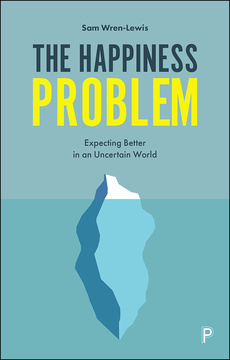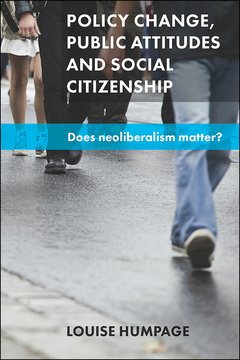Published
Sep 10, 2008Page count
288 pagesISBN
978-1847420800Dimensions
234 x 156 mmImprint
Policy PressPublished
Sep 10, 2008Page count
288 pagesISBN
978-1847420817Dimensions
234 x 156 mmImprint
Policy PressPublished
Sep 10, 2008Page count
288 pagesISBN
978-1447315445Imprint
Policy PressPublished
Sep 10, 2008Page count
288 pagesISBN
978-1447315452Imprint
Policy PressResearch on well-being reveals the significance of personal relationships, trust and participation to sustain quality of life, yet it is the economic model that remains the dominant basis for political and social institutions and policy.
In this original book, Bill Jordan presents a new analysis of well-being in terms of social value, and outlines how it could be incorporated into public policy decisions. He argues that the grandiose attempt to maximise welfare and regulate social relations through contract, in line with the economic theory of information and incentives, is counterproductive for well-being. Instead, both the quality of personal experience and the restraints necessary for a convivial collective life would be better served by a focus on cultures and institutions. This book will be an essential text for academics and students in social theory, social welfare, public policy and governance.
Bill Jordan is Professor of Social Policy at Plymouth and Huddersfield Universities. He has held visiting chairs in Germany, the Netherlands, Denmark, Slovakia and Hungary. He worked for 20 years in the UK social services, and is the author of 25 books on social policy, social theory, politics and social work.
"This work offers a provocative and compelling critique of economic orthodoxy, which illuminates the growing gap between welfare and well-being in modern society. Challenging conventional ideas about the good life, Jordan's masterful and wide-ranging analysis marshals a powerful call for the reconstruction of social value." Neil Gilbert, Chernin Professor of Social Welfare, University of California, Berkeley
"An essential read for those who care about forming a rational public policy that takes into account not only economic incentives, but also personal relationships, environmental surroundings and other non-material aspects of our lives that are too easily dismissed." Amir Paz-Fuchs, Assistant Professor, Ono Academic College, Israel
"This is a reasoned yet passionate critique of contract and public choice theory and charts a way forward for a progressive social policy." Professor Ian Gough, Department of Social and Policy Sciences, University of Bath
"Bill Jordan writes in a lucid and elegant way about the limitations of material conceptions of well-being and of the contract model of welfare. Jordan covers a wide array of material and approaches, all seamlessly woven together to provide an easily accessible but profound insight into the delivery of public services in Britain today. His account of the way marketized social relations become corrosive of civic character is both chilling and timely." Louise Haagh, University of York
Gilbert and Paz-Fuch's testimonials in reviews. 2 more to come! Speak to author about which to include?
Bill Jordan is Professor of Social Policy at Plymouth and Huddersfield Universities. He has held visiting chairs in Germany, the Netherlands, Denmark, Slovakia and Hungary. He worked for 20 years in the UK social services, and is the author of 25 books on social policy, social theory, politics and social work.
Introduction; The Easterlin Paradox and the dominance of the economic model; Well-being and social value: 'I shall not come to your funeral';
Part One: Welfare: Welfare and the economic model: 'being precisely wrong'; Social capital: the missing link?; Players, members, spectators and bystanders: benefits for non-participants;
Part Two: Well-being: Social value and well-being: paying tribute; How social value works; Institutions and culture;
Part Three: Public policy: Welfare economics and public policy: 'sputtering out'; Social value and public policy: making citizens; Justice, equality and social value; Conclusion.












